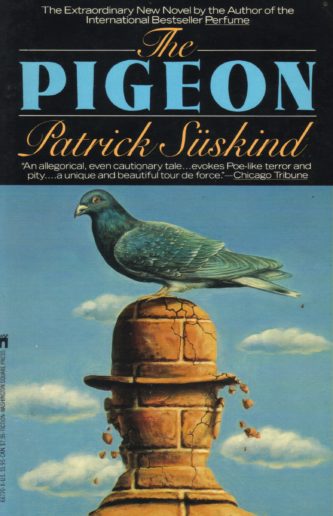 By PATRCK SUSKIND (Washington Square Press; 1987/89)
By PATRCK SUSKIND (Washington Square Press; 1987/89)
It’s never easy topping a success. In the case of German wunderkind Patrick Suskind, whose 1985 debut PERFUME was an international bestseller and one of the absolute finest novels of the decade, he didn’t even try.
THE PIGEON, Suskind’s second novel, is a short (barely over 100 pages) and bleakly comic account of a chaotic day in the life of a severely repressed man. Critics, apparently still under the spell of PERFUME, greeted it with a lot of overenthusiastic praise (the blurbs on the paperback edition compare it to Aristotle, Dostoyevsky and DEATH IN VENICE), but in actuality THE PIGEON is pretty slight. It’s well written, certainly, but also forgettable, and completely lacking the resonance of PERFUME.
The overall concept is a well-worn cliché: an absurdly buttoned-down individual sustained by routine is confronted with something that shakes up his orderly universe. That individual is Jonathan Noel, a middle aged bank guard who, traumatized by a Nazi-scarred WWII-era childhood, has carefully arranged his life so nothing unexpected occurs. One morning, though, he’s confronted with a pigeon on the landing of the attic room he rents, glaring at Jonathan with its left eye: “This eye, a small, circular disc, brown with a black center, was dreadful to behold…browless, quite naked, turned quite shamelessly to the world and monstrously open…”
This encounter terrifies Jonathan, and completely turns his life upside down. As the day wears on he finds himself committing such unheard-of breaks in his routine as addressing his landlady directly and being less than attentive on his job. The ultimate humiliation occurs when he rips his pants, inspiring downright apocalyptic rage in passages that bring to mind the evil Grenouille of PERFUME: “So universal, so titanic was Jonathan’s hate that afternoon, that he would have liked to reduce the world to rubble and ashes, because he had a hole in his trousers!”
From there Jonathan checks into a hotel so he won’t have to see the pigeon again. There he confronts the childhood anxieties that led to his present state, in time for the expected happy ending in which Jonathan finally learns to accept the messiness of life and humanity. Ho hum.
